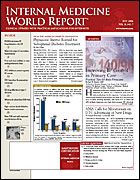Diabetes, Poor Drug Compliance Predict Uncontrolled Hypertension
Diabetes, Poor Drug Compliance Predict Uncontrolled Hypertension
SAN FRANCISCO—Diabetes and poor medication compliance are significant
predictors of uncontrolled blood pressure (BP) in treated hypertensive
patients in the primary care setting, according to data presented at the 20th
American Society of Hypertension annual meeting that showed that only
about one third of patients with diabetes had their BP controlled. Previous data have shown that compliance with antihypertensive therapy is an important predictor of therapeutic outcome. In one study, in >50% of patients who failed to achieve goal BP, the problem was suboptimal patient drug compliance rather than an inadequate therapeutic regimen, noted Tamara Santiago,
PharmD, of the Baton Rouge Clinic AMC, Baton Rouge, La. In community settings, BP control
rates in different racial and ethnic groups ranged from 24% to 47%, which is much
worse than the control rates demonstr ted in highly controlled clinical trial settings,
noted Dr Santiago.The Baton Rouge Clinic is a multispecialty, regional medical center that provides health care services to >150,000 patients throughout the Southeast. A random
sample of 506 patients from the clinic with a primary diagnosis of hypertension was selected for retrospective medical chart review. BP control was defined as systolic BP
(SBP) <140 mm Hg and diastolic BP (DBP) <90 mm Hg; for patients with diabetes
or chronic kidney disease, it was SBP <130 mm Hg and DBP <80 mm Hg.
Overall, 61% of patients had controlled BP, but only 38% of patients with
hypertension and diabetes had their BP controlled. When factoring in age and
gender, diabetes reduced the likelihood of achieving BP control by 86%
(P <.001); poor compliance reduced it by 65%.
